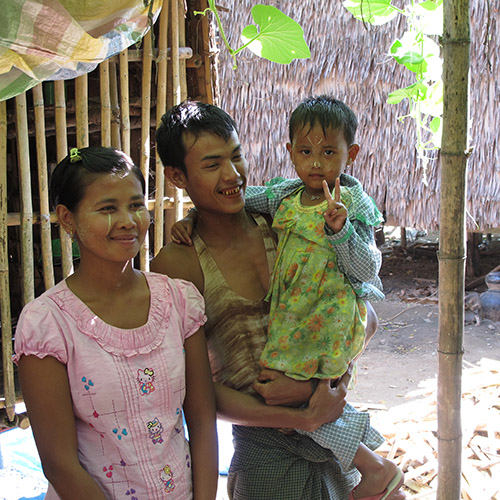Stories of Change

One of the families who participated in the program. Photo: Laura Curkendall/CWS
In Myanmar, partnering with parents to improve child nutrition
It is morning on the Ayeyarwady River. Today our team is traveling to two communities in Myanmar, or Burma, that participate in a CWS program to improve the nutrition of young children. The program is now in five villages and will expand soon to an additional five.
Because of perennial flooding, these villages are only accessible by boat this time of year. They are located outside the town of Maubin, which is about two hours by car from Myanmar’s largest city of Yangon.
For these communities, the river is life. Fishing is part of many families’ income. The river is like a highway here. It is how remote villages connect to one another, access markets in larger towns and get to hospitals and clinics when needed.
Unfortunately, the river can also mean danger and destruction. Increasingly frequent and heavy rains, combined with deforestation upriver, lead to more and more water pounding against the banks at each turn. Soil is eroding and land is being washed away at an alarming rate.
In these villages, the families that we talked to told us that they have had to move as many as six times in the last eight years as their homes washed into the river. For the already poor families who live along this river’s bank, the need to repeatedly buy new land and rebuild even a basic home so frequently deepens their poverty.
Among other things, poverty takes its toll on the children in these villages. Malnutrition and a failure to thrive are common here.
Thanks to donor support, CWS has been able to team up with the parents of young children here for a series of informational talks about family health and wellbeing. The sessions cover a wide range of topics to help parents keep their children healthy and strong. One talk focused on something that seems very basic: how different parts of a daily diet have different purposes, like preventing disease or providing energy.
Another talk addressed personal and household cleanliness, which is one part of village life where small changes to daily routine can make a big difference. For example, parents learned about the importance of washing their children’s faces and brushing their teeth once or twice every day. The talk also focused on washing hands after using latrines and taking basic precautions with standing and stored water to not attract mosquitoes, which carry diseases.
During our visit, we were happy to hear some parents report that they have already changed some of their daily routines after the CWS talks, and some even said that they had already noticed the benefits for their children.
Not surprisingly, the most popular talk for most families was the one about raising poultry. CWS team members shared best practices for poultry raising and gave chickens to dozens of families. Each family received a rooster and three hens with an understanding that, in a year, they will give back one rooster and three hens, while any more new chickens born in the year are theirs to keep.
Parents told us that they plan to use the chickens both for extra income and to better feed their children. New chickens can be sold in markets, as can eggs. Eggs and poultry add extra diversity – and much-needed protein – to families’ diets, too.
Many families we visited already had home gardens. They are growing fruits and vegetables, and now CWS will help them diversify their gardens or start new ones by giving them additional vegetable seeds. Since one of the CWS info sessions focused on making and using organic compost, they now have new knowledge to help them grow more crops. These new vegetables will be a nutritious addition to children’s diets and will provide extra income for families, both of which are important here.
We heard from some parents that the impact of this community education is already being felt. One father pointed to chubby four-month-old Shine Htet Lin and told us that he is sure that the knowledge parents have received – and are putting to use – has contributed to the baby’s good health.
No two families are the same, and neither are any two communities. This means that when CWS partners with parents so they can improve their children’s diet, there are a lot of different topics to cover, and a lot of different ways that the information we share has an impact.
We are helping families meet specific challenges they face in their daily lives, like providing nutritious food for their children and having extra income from raising chickens or planting new vegetables. Together, we are working with these families in Myanmar, and many like them worldwide, to help them ensure a brighter future for the next generation.
